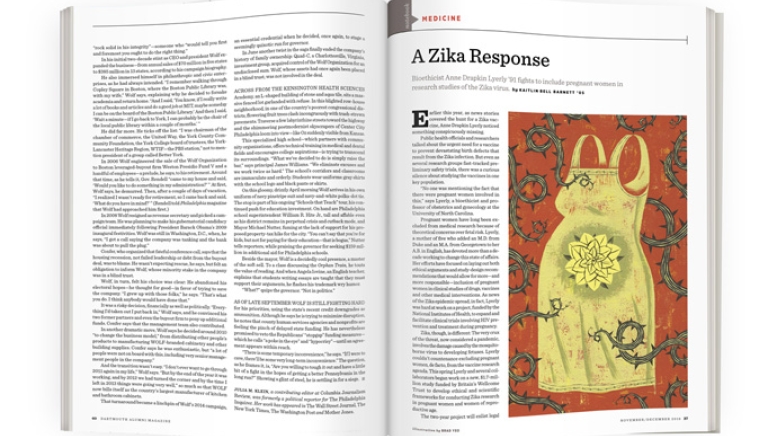Earlier this year, as news stories covered the hunt for a Zika vaccine, Anne Drapkin Lyerly noticed something conspicuously missing.
Public health officials and researchers talked about the urgent need for a vaccine to prevent devastating birth defects that result from the Zika infection. But even as several research groups fast-tracked preliminary safety trials, there was a curious silence about studying the vaccines in one key population.
“No one was mentioning the fact that there were pregnant women involved in this,” says Lyerly, a bioethicist and professor of obstetrics and gynecology at the University of North Carolina.
Pregnant women have long been excluded from medical research because of theoretical concerns over fetal risk. Lyerly, a mother of five who added an M.D. from Duke and an M.A. from Georgetown to her A.B. in English, has devoted more than a decade working to change this state of affairs. Her efforts have focused on laying out both ethical arguments and study-design recommendations that would allow for more—and more responsible—inclusion of pregnant women in clinical studies of drugs, vaccines and other medical interventions. As news of the Zika epidemic spread, in fact, Lyerly was hard at work on a project, funded by the National Institutes of Health, to expand and facilitate clinical trials involving HIV prevention and treatment during pregnancy.
Zika, though, is different: The very crux of the threat, now considered a pandemic, involves the damage caused by the mosquito- borne virus to developing fetuses. Lyerly couldn’t countenance excluding pregnant women, de facto, from the vaccine research agenda. This spring Lyerly and several collaborators began work on a new, $1.7-million study funded by Britain’s Wellcome Trust to develop ethical and scientific frameworks for conducting Zika research in pregnant women and women of reproductive age.
The two-year project will enlist legal and public health experts, vaccine and infectious disease researchers, maternal-fetal medicine physicians, and even an anthropologist and a historian to put the epidemic and the group’s recommendations in cultural and historical context. The project will focus first on Zika, then expand guidelines to include other public health emergencies.
Even with the urgent threat of Zika looming, Lyerly knows the project will have to combat powerful and long-held taboos about including pregnant women in medical studies. “Some people just think it is too difficult—that it’s next to impossible to include pregnant women in research,” she says. Rather than putting in the hard work to figure out how to do that, she says, the attitude is, “Let’s not even bring it up because it’s such a quagmire.”
Lyerly has devoted much of her career in bioethics to demonstrating that such research need not be the ethical and logistical minefield that many people fear. In fact, failing to conduct certain types of studies, she argues, can leave doctors and pregnant women without the data they need to make informed decisions about treatment. Lyerly wrestled with this dilemma directly while practicing obstetrics at Duke. She recalls tears streaming down the faces of severely depressed patients who were reluctant to take antidepressants for fear of harming their unborn children. With scant or conflicting evidence on how such drugs affected the developing fetus, Lyerly didn’t know how to advise these women about risk. “I couldn’t doctor in the way that I wanted to,” she says.
Lyerly also observed firsthand the considerable barriers that researchers face when it comes to including pregnant women in their studies. At Duke she served on several institutional review boards that oversaw studies involving human subjects. Pregnant women were almost categorically left out of studies, and researchers who wanted to include them “had to justify the heck out of it,” she says, even for studies that posed no risk to the fetus.
To address this research gap, Lyerly and two of her collaborators on the Zika project, Ruth Faden of Johns Hopkins and Margaret Little of Georgetown, founded the Second Wave Initiative, a bioethics collaboration that aims to encourage and make possible more and better-quality research on treating illness in pregnancy.
Jeanne Sheffield, director of maternal-fetal medicine at Johns Hopkins, calls Lyerly’s work crucial, given the lack of data on vaccines and treatments that are standard care for the general adult population but remain woefully unstudied in pregnant women. “The common question, ‘Will this harm my baby?’ is surprisingly difficult to answer,” Sheffield says. “Dr. Lyerly’s work promoting the inclusion of pregnant women in clinical trials is vitally important for the wellbeing of both a mother and her unborn child.”
With Zika, some have suggested it’s better to assess vaccine safety and efficacy in pregnant women after the fact, perhaps by studying women who are inoculated without knowing they’re pregnant. Such an approach would be shortsighted at best, Lyerly argues. With Zika and with other illnesses, it’s more ethical to collect data about medical interventions in a controlled environment, in studies carefully designed to monitor safety and efficacy in pregnant women. “It’s not only about protecting pregnant women from research trials,” Lyerly says. It is, she says, about protecting them through research so that doctors and patients can make the best-informed treatment decisions.
Lyerly’s job is to hammer out the details. “I want to make sure that the way we apply this is moving us toward better care for women who face illness in pregnancy,”
she says.
Kaitlin Bell Barnett is a freelance writer based in Troy, New York.




